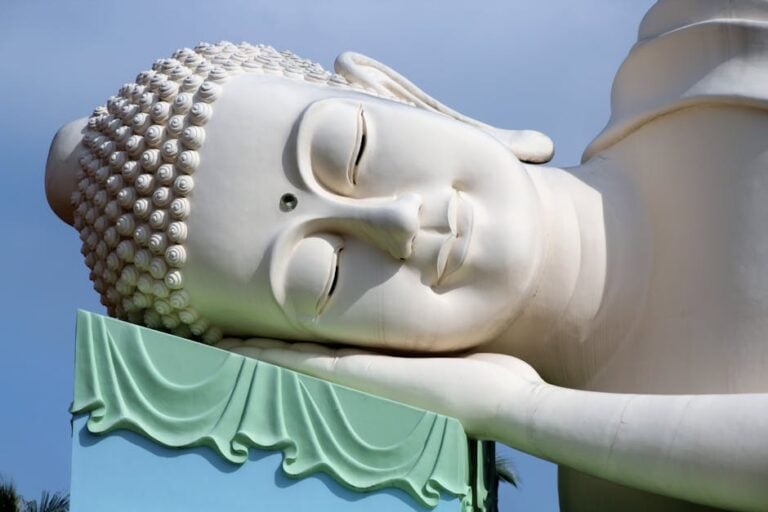In-Depth Guide to the Importance of Sleep in Buddhism
Overview of the Importance of Sleep in Buddhism
Understanding the importance of sleep in Buddhism reveals how this ancient tradition emphasizes rest as essential for both physical and spiritual health. Within the teachings, sleep is not merely an indulgence but a vital aspect of achieving balance, mindfulness, and deeper engagement in spiritual practices.
1. Balance: Adequate sleep is fundamental for maintaining balance in life’s activities.
2. Mindfulness: Proper rest facilitates mindfulness, providing clarity for meditation and daily existence.
3. Spiritual Practice: Quality sleep enhances spiritual practices, helping to deepen meditation and self-awareness.
The Buddha’s admonitions to lazy monks reflect this philosophy. While he criticized excessive slumber, his core message was not about shunning sleep but rather ensuring that practitioners maintain an aware and alert mind. Notably, figures like Ven. Chi Chern and Ven. Guo Dong from Dharma Drum Mountain underscore a balanced approach to sleep, advocating for moderation and simplicity to promote restful nights.
As a long-time advocate for understanding the role of sleep in Buddhism, I, Ben Trapskin, creator of Yawnder, have witnessed firsthand the difference quality rest makes in both physical functionality and spiritual practices. Finding the right balance is crucial for those exploring their spiritual paths.
The Role of Sleep in Buddhism
Buddha’s Perspective on Sleep
The Buddha had significant insights regarding sleep. In his teachings, he outlined that mindfulness, restorative rest, and active engagement in spiritual rituals are essential for a fulfilling life. Sleep goes beyond mere physical necessity; it serves as a key element in one’s spiritual journey.
A compelling tale from the Dharmapadavadana Sutra illustrates this. The Buddha encountered a monk caught in the grip of excessive sleep. He inspired the monk to awaken and embrace mindfulness, indicating that while sleep is necessary, laziness could forestall spiritual growth.
The Consequences of Excessive Sleep
In Buddhist philosophy, the perils of excessive sleep are profound. The Dharmapadavadana Sutra warns about the consequences of overindulgence—where one might squander precious opportunities for spiritual practice. Here are the potential pitfalls:
– Laziness: Over-sleeping can lead to lethargy, diminishing one’s motivation and agility.
– Retribution: Excessive sleeping may bring about negative karma, as noted in various Buddhist texts.
– Spiritual Decline: Lack of diligence in one’s spiritual practices can stall progress, leading to stagnation.
The Importance of Proper Sleep
Achieving a state of equilibrium through proper sleep is essential for overall health and spiritual receptiveness. The Buddha highlighted that a well-rested mind is equipped to reach higher clarity and mindfulness. Key reasons for prioritizing proper sleep include:
– Balance: A harmonious balance between activity and rest is crucial for well-being.
– Health: Quality sleep rejuvenates both mind and body, promoting optimal physical health.
– Spiritual Receptiveness: An alert mind is more attuned to spiritual teachings and practices.
– Clarity of Mind: Sound sleep enhances mental clarity, making meditation and spiritual activities more effective.
Ultimately, recognizing the importance of sleep in Buddhism fosters a profound understanding that rest is pivotal not only for physical health but also as a catalyst for spiritual journeying.
Buddhist Practices for Better Sleep
Meditation and Mindfulness
Central to Buddhist practice is meditation, particularly valuable for enhancing sleep quality. It calms the mind, alleviating stress and anxiety that can disrupt rest. Techniques like Shinay (calm abiding meditation) are essential in this regard, promoting emotional equilibrium and helping practitioners foster a state reminiscent of deep sleep.
Furthermore, mindfulness—the practice of being present and aware—integrates seamlessly into daily life. Zen Buddhist monk Rev. Ichido Uchida advocates for mindfulness across various routines, leading to a tranquil state conducive to sleep. By acknowledging your thoughts and feelings throughout the day, you can reduce mind clutter, easing your transition to rest.
The Right Sleeping Position
Buddhist texts advocate specific sleeping positions for deep rest. The Buddha recommended resting on the right side, with feet together, concentrating on positive attributes. This posture promotes mindfulness and serenity, facilitating peaceful slumber. Master Yinshun emphasized that focusing on light and luminosity while sleeping could help maintain awareness and minimize unrest.
Developing Good Sleep Habits
Sleep hygiene is pivotal for achieving quality sleep. Here are some actionable tips rooted in Buddhist teachings:
– Consistent Sleep Schedule: Maintain regular sleep and wake times to regulate your internal body clock.
– Relaxation Techniques: Cultivate a calming pre-sleep routine, avoiding stimulating activities before bed.
– Sleep Environment: Ensure a soothing sleep setting by controlling room temperature, reducing noise, and investing in comfort.
– Limit Screen Time: Refrain from screens at least an hour before sleep to support melatonin production.
– Mind Your Diet: Steer clear of heavy meals, caffeine, and alcohol close to bedtime.
– Exercise Regularly: Engaging in physical activity fosters better sleep quality and diminishes stress.
The Spiritual Benefits of Quality Sleep
Quality sleep directly impacts reducing afflictions such as greed, anger, and ignorance—hallmarks of the Buddhist understanding of suffering. Rested minds are clearer and more receptive to spiritual practices. Ven. Guo Dong emphasizes that releasing negative thoughts facilitates a more relaxed mind, less susceptible to these mental afflictions.
In the pursuit of enlightenment, proper sleep emerges as a foundational pillar. A well-rested mind maintains mindfulness, enriching your spiritual engagements throughout the day. Ven. Chi Chern highlights that restorative sleep sharpens focus, enabling practitioners to embody the present moment—a crucial element of spiritual receptiveness.
In conclusion, understanding the importance of sleep in Buddhism reveals its multifaceted role in cultivating not just physical health but also spiritual balance. By embracing appropriate sleep practices, we pave the way for deeper engagement in our spiritual pursuits.
Frequently Asked Questions about the Importance of Sleep in Buddhism
What does Buddhism say about sleep?
Buddhist teachings emphasize the necessity of sleep for achieving physical and spiritual harmony. Quality rest fosters mindfulness and readiness for meditation.
What is the spiritual importance of sleep?
Sleep is vital for maintaining a sharp and clear mind, essential for absorbing spiritual teachings and sustaining mindfulness.
What is the Buddha’s suggested sleeping position?
The Buddha recommended lying on one’s right side to achieve peaceful rest, reflecting mindfulness principles and serving as a model for practitioners.
By integrating Buddhist wisdom with contemporary sleep insights, we can further appreciate the importance of sleep in Buddhism and its contribution to a rich, fulfilling life.


















